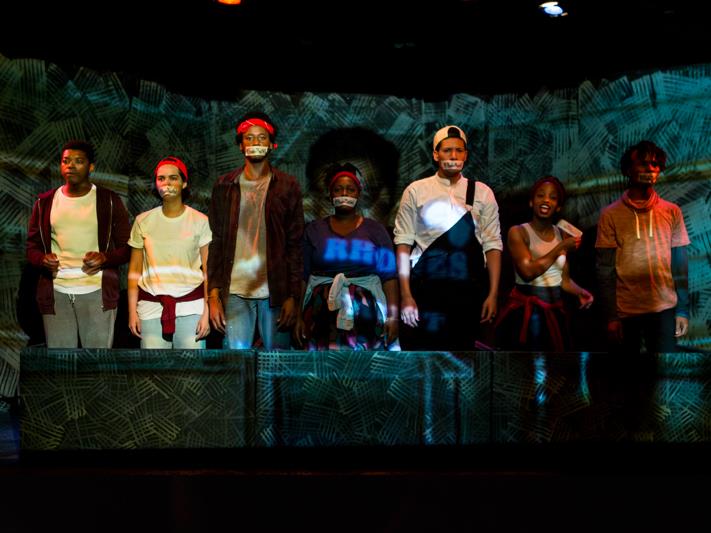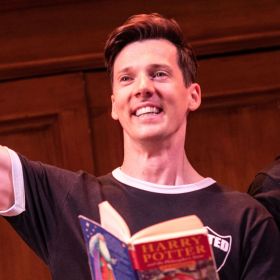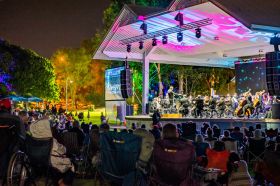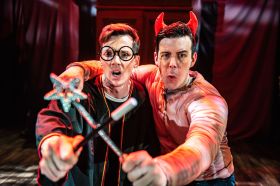The Fall was co-written in 2015 by Ameera Conrad, Oarabile Ditsele, Kgomotso Khunoane, Tankiso Mamabolo, Thando Mangcu, Sizwesandile Mnisi, Sihle Mnqwazana and Cleo Raatus. Supplied.
How lucky I was to see this social documentary performance, The Fall, from South Africa touring as part of the Big World, Up Close, currently showing at the Fairfax Theatre, Arts Centre. The Fall is produced by the Baxter Theatre Centre in Cape Town, which represents a key force in anti-apartheid performance since its inception in 1977.
Here they were, seven of the students who were part of the 2015 uprising in Cape Town University that called for a decolonisation of higher educational institutions in all its forms. A demand for the removal of the statue of colonialist Cecil Rhodes from its central position overlooking Cape Town University’s campus was made.
From their articulate and vocal protests the #rhodesmustfall movement was born. This movement has set alight students, throughout the world, to challenge the great machines of knowledge and power that are Universities. The movement demanded an end to structural educational inequality, as well as a fundamental rethink of European patriarchal systems of knowledge which instill binaries that marginalise and dichotomise the “Other” in age, race, ethnicity, ability and sexuality.
The Fall was co-written in 2015 by Ameera Conrad, Oarabile Ditsele, Kgomotso Khunoane, Tankiso Mamabolo, Thando Mangcu, Sizwesandile Mnisi, Sihle Mnqwazana and Cleo Raatus who have been performing to packed houses in New York and London, also winning a ‘Fringe First’ at the Edinburgh Festival.
Seven young vital people danced onto the bare stage of the Fairfax theatre, but their vitality was not solely attributable to their youth, for it sprang from a deeper place, a place of long-held frustration, anger and pain that had become, through them, a force for change.
As Achille Mbembe, political philosopher, stated in 2015 at the time of the uprising, ‘The winds blowing from our campuses can be felt afar, in a different idiom, in those territories of abandonment where the violence of poverty and demoralisation having become the norm many have nothing left to lose and are now more than ever willing to risk a fight. They simply can no longer wait, having waited for too long now.’
Running into the space, the bare theatre stage was electrified by the seven students. Their presence and performance (in which they worked always as a group) moved seamlessly from beautiful African songs and dances, to emerge momentarily solo for heartfelt autobiographical speeches spoken directly to the audience. The students would then reform back behind the scenes of the 2015 protests with reenactments of the private discussions that occurred during that time in the classrooms of the university.
The substance of the discussions and the conflicts that arose between the seven students, was a key content in the show, providing information about the events, and about the processes of debate and revealing clearly the diversity of positions of those who, though united by their oppression, felt irreconcilable in many of their concerns. The dialogue richly expounded the complexity that the process of decolonisation presents to the world today.
The idiom of theatre became, through their voices, their words and their bodies, a powerful medium to inspire others who also deeply feel the need for a re-examination of the status quo, and to ask for dialogues to begin wherever the seeds of their thinking took root.
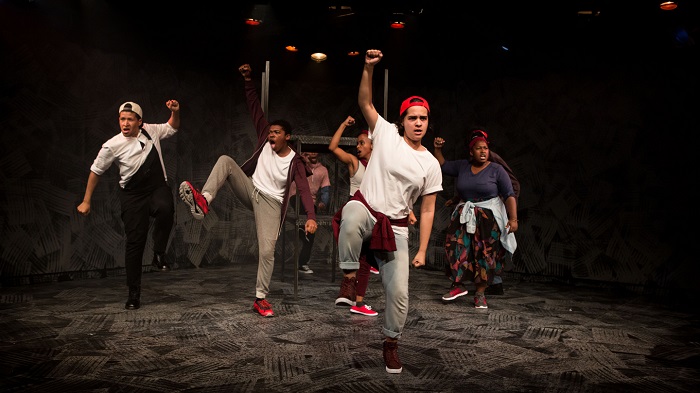
The cast of The Fall. Supplied.
As promised by their media release: ‘The play does not offer solutions to the questions raised.but hopes to create and nurture dialogue’. The Fall left me feeling hungry to know more about the #rhodesmustfall movement, how it had unfolded and the implications of its mandates. I felt deeply grateful to hear these voices unapologetically criticising academic institutions for their dominant white patriarchal paradigms which have seemed forever to be the canvas on which the stuff of knowledge is presented.
The combustibility of the issues these students have raised against institutionalised racism and structural educational inequality in many forms, including this show, has sparked innumerable protests, throughout South Africa, the US and notably at Oxford University in which students forefront racist symbols and structural inequality, as regards under representation of non-white male staff and students, financial disadvantage and racially, gender biased syllabus choices to name but a few.
The students in The Fall described themselves as ‘tired’ and ‘exhausted’ by their fight. However, such theatre as theirs recharges its audiences to stand up against the slow incremental: ‘fungus of the failure to think’, as Jewish refugee Hannah Arendt wrote in her warnings against totalitarianism.
The Fall presents the provocation for its audiences to wake up and to have a dialogue. That is the gift these Cape Town students are offering with their distinctly African and creative generosity.
A spontaneous standing ovation greeted the performers at its close. It was seemingly impossible for all present to not be filled with charged respect for these people who were seeking so much positive change in the face of high conflict situations.
5 stars ★★★★★
The Fall
The Fall is part of the Big World, Up Close series
Written by: Ameera Conrad, Oarabile Ditsele, Tankiso Mamabolo, Thando Mangcu, Sizwesandile Mnisi, Sihle Mnqwazana, Cleo Raatus, Kgomotso Khunoane
Cast: Ameera Conrad, Oarabile Ditsele, Zandile Madliwa, Tankiso Mamabolo, Sizwesandile Mnisi, Sihle Mnqwazana, Cleo Raatus
Cast Curators: Ameera Conrad, Thando Mangcu
Costume Design: Marisa Steenkamp
Set Design: Patrick Curtis
28 August – 2 September 2018
Fairfax Theatre, Arts Centre, Melbourne
